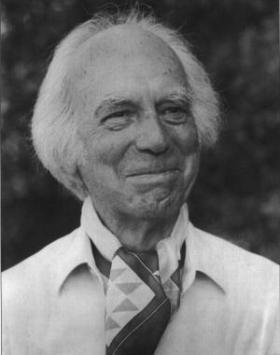The true aim of our existence is to be, without conditioning. This is the only way of life promising joy, freedom and peace.
The body wakes up in the morning the world appears. It is perceived by the five senses and conceived by the sixth sense, the brain.
The world exists only when we think about it; creation stories are for children. In reality the world is created every moment.
Give to your fellow what he needs to accomplish what life asked of him. Do not impose on another your idea of how he should best live.
You are primal awareness. Life is only primal awareness. Between two thoughts or two perceptions you are. You know moments in your life when a thought completely disappears into silence, but still you are.
The only way out is to simply observe. This allows us to take note of our physical reactions, or mental attitudes and patterns in her motivations at the exact moment they appear on it involve no evaluation, no analysis which is based on memory.
Life
Birth: Jean Klein was born around 1916 and spent his childhood in Brno (in Czechoslovakia), Prague, and Vienna.
Realization: At seventeen Jean Klein enjoyed his first experience of what he called “my own silence.” He describes a “glimpse of oneness or self-awareness”. According to him “I was waiting one warm afternoon for a train. The platform was deserted and the landscape sleepy. It was silent. The train was late, and I waited without waiting, very relaxed and free from all thinking. Suddenly a cock crowed and the unusual sound made me aware of my silence. It was not the objective silence I was aware of, as often happens when one is in a quiet place and a sudden sound throws into relief the silence around. No, I was ejected into my own silence. I felt myself in awareness beyond the sound or the silence. Subsequently, this feeling visited my several times.”
Death: Jean Klein passes away on February 22th, 1998 in Santa Barbara.
Teaching Style: The teachings of Jean Klein belong to the “direct way”. He says that he had an “urge to communicate my experience to all other beings” and his master suggested that he do so in Europe since he was himself European. In several of his books, it is stated that he “was sent back to…teach Vedanta” . He started teaching about 1960. He told that “People came to me. I have never taken myself for a teacher, so I never solicited students. The teacher only appears when asked to teach”.
Fame: Jean Klein, musicologist and medical doctor from Central Europe, spent many years in India, studying Advaita and Yoga. Since 1960 he has been teaching, first mainly in Europe and since 1980 both in Europe and the United States. The teachings of Jean Klein belong to the “direct way”. In this respect Jean Klein is on a par with teachers like Ramana Maharshi, Atmananda Krishna Menon and Nisargadatta Maharaj. A distinction between Jean Klein and these teachers is that Jean Klein was a practitioner of yoga-bodywork and he transmitted this art to those who were interested.
Legacy: Jean Klein was especially influenced by Gandhi, whose teaching of ahinsa/non-violence led him to become a vegetarian when he was 16. He also read people like Coomaraswamy, Aurobindo, and Krishnamurti (though he found Theosophy itself too sentimental). But the person who had the greatest impact on him was Rene Guenon.
Teachings
The teaching that Jean Klein gives, manly, that one’s true nature is ‘ultimate awareness’ which exists independently of any object of perception, including thoughts.
He told that “You are primal awareness. Life is only primal awareness. Between two thoughts or two perceptions you are. You know moments in your life when a thought completely disappears into silence, but still you are.”
When you take yourself for somebody, all relationships are from object to object, man to woman, mother to son, personality to personality. And there is no communication, no possibility for love.
All objects point to the Ultimate and a real work of art actively brings whoever sees or hears it to his real nature, which is beauty. The difference between an ordinary object and a work of art is that the object is passive in its pointing towards the Ultimate whereas the work of art is active.
All disciplines are fixations: discipline excludes everything, except the one thing that one wishes to concentrate upon.

